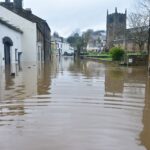Unprecedented Flooding in Libya Leaves 10,000 Missing: A Catastrophe Amidst Political Turmoil
Rising Death Toll and Devastation in Derna
The Red Cross has reported that in the wake of unprecedented flooding in Libya, a staggering 10,000 people are missing. As the extent of the damage to the port city of Derna becomes more apparent, the death toll continues to rise. Tamer Ramadan, the Libya envoy for the International Federation of Red Cross and Red Crescent Societies, emphasized the magnitude of the disaster during a UN briefing in Geneva, describing the death toll as “huge.” On the other hand, Othman Abdel Jalil, the health minister in the administration controlling the east of Libya, stated that over 3,000 deaths have been confirmed. However, he expects the number of missing people to reach 10,000.
The city of Derna has been particularly hard hit, with entire neighborhoods washed away by the floods. Local health officials have reported that more than 700 bodies are waiting to be identified in the overflowing cemetery, and up to 5,000 people are still missing. Hichem Chkiouat, the minister of civil aviation, described the situation as disastrous, with bodies scattered everywhere – in the sea, in the valleys, and under collapsed buildings. He estimated that 25% of the city has disappeared, with a significant number of buildings having collapsed.
Desperate citizens have taken to social media to appeal for information about missing relatives. Many express their frustration with the slow pace of the relief effort. Furthermore, questions are arising about previous warnings regarding the need for the reconstruction of Derna’s dams. A 2022 academic report predicted that a flood equivalent to one in 1959 would likely lead to a collapse of one of the two dams, putting the city of Derna and its residents at high risk of flooding.
The Impact of Political Turmoil and Infighting
The catastrophic flooding in Libya not only reveals the devastating effects of a natural disaster but also shines a light on the country’s long-standing political turmoil. Since the 2011 uprising that led to the death of former ruler Muammar Gaddafi, Libya has been torn apart by internal divisions, corruption, and external interference. Despite efforts over the past decade to establish a unified functioning government, two rival governments supported by their own militias persist, with one based in Tripoli in the west and the other in Tobruk in the east.
This political fragmentation, combined with dwindling investments in infrastructure and public services, has left Libya ill-prepared for natural disasters. The lack of regulation in private building, minimal maintenance of critical infrastructure like dams, and the absence of an effective emergency response system have exacerbated the impact of the floods on vulnerable communities.
Humanitarian Aid and Immediate Response
Amidst the chaos and devastation, efforts are being made to provide humanitarian aid and address the immediate needs of the affected population. An emergency medical supply plane carrying essential supplies, medication, equipment, and medical personnel has been dispatched to Benghazi, a city heavily impacted by the floods. Additionally, Gen Khalifa Haftar, the warlord leading an army in the east of Libya, has stated that aid is being delivered.
However, the slow response and lack of a coordinated relief effort have drawn criticism from affected citizens. People are rightfully demanding answers as to why there were no immediate warnings about the risks posed by the dams and why evacuation plans, if they existed, were not implemented. The failure to study weather conditions and adequately assess the potential impact of the storm has contributed to the severity of the disaster.
Editorial: Reflecting on the Tragedy in Libya
The catastrophic flooding in Libya should serve as a wake-up call for both Libyan authorities and the international community. It starkly illustrates the consequences of neglecting infrastructure development, failing to prioritize disaster preparedness, and allowing political turmoil to impede progress. The loss of thousands of lives and the destruction of entire communities demand immediate action and sustained commitment to rebuilding and protecting vulnerable areas.
The international community must step up. It is imperative to provide robust and timely support for humanitarian efforts in Libya. This includes not only addressing the immediate needs of the affected population but also investing in long-term solutions, such as infrastructure development and disaster management systems. Collaborative efforts and coordination among various international actors, non-governmental organizations, and local authorities are crucial to ensuring a comprehensive and effective response.
Moreover, Libyan authorities must take responsibility for the safety and well-being of their citizens. It is imperative to prioritize the reconstruction of vital infrastructure, enforce regulations to prevent further vulnerability, and establish an efficient emergency response system. In the face of continued political divisions, parallel governments, and armed militias, a concerted effort must be made to establish a unified and functioning government that can effectively address the needs of the Libyan people.
Advice: Learning from Tragedy
The tragedy in Libya serves as a reminder to nations around the world of the importance of disaster preparedness and proactive investment in resilient infrastructure. It is crucial to learn from these events and take the following steps:
1. Assess Vulnerabilities
Governments should conduct thorough assessments of their infrastructure, particularly in areas prone to natural disasters. Identifying vulnerabilities and implementing measures to mitigate risks can significantly reduce the impact of future disasters.
2. Prioritize Disaster Preparedness
Investing in disaster preparedness and response systems should be a priority for governments. Adequate training, early warning systems, and evacuation plans should be in place to ensure the safety of communities in times of emergency.
3. Strengthen International Cooperation
International cooperation is vital when responding to global crises. When disasters strike, countries should offer mutual assistance and support, recognizing that the impact of natural disasters often transcends national boundaries.
4. Address Underlying Issues
Political stability and effective governance are fundamental in mitigating the impact of natural disasters. Governments must prioritize the needs of their citizens, invest in public infrastructure, and create legislation that regulates private building and ensures structural resilience.
5. Promote Climate Change Mitigation and Adaptation
The increasing frequency and severity of extreme weather events are clear indicators of the impact of climate change. Countries must prioritize efforts to mitigate greenhouse gas emissions and adapt to a changing climate to minimize the risk of future disasters.
It is through these proactive measures that nations can better protect their citizens and build resilient communities capable of withstanding the challenges brought about by natural disasters. The tragedy in Libya should not repeat itself elsewhere; it should serve as a call to action for countries worldwide to prioritize disaster preparedness and resilience.

<< photo by Vadim Sadovski >>
The image is for illustrative purposes only and does not depict the actual situation.
You might want to read !
- The Humanitarian Crisis Unveiled: The Unprecedented Floods in Libya Leave 10,000 Missing
- Metros Back on Track: Recounting the Chaos of Flooding during the Great North Run
- A Stalemate: Wales and South Korea’s Goalless Friendly Reflects Lack of Firepower
- The Mysterious Vanishing Act: Speculation Surrounds the Disappearance of Drake and Bobbi Althoff Podcast
- “The Horrific Case of Robert Black: Unveiling the Tragic Fate of an 11-Year-Old Girl”
- “Devastation Strikes: A Grim Aftermath of the Morocco Earthquake”
- Florida Braces for Unprecedented Hurricane Idalia’s Wrath
- Title: Navigating the COVID Vaccine Rollout: Deciphering Priority Recipients
- “sidemen Charity Match Turns Tragic as Theo Baker Suffers Gruesome Injury”
- Unveiling Unseen Footage: Exclusive Insider Perspective on 9/11 – 60 Minutes
- Germany’s Defeat: Reflecting on the Goals and Summary of Japan’s Dominance




